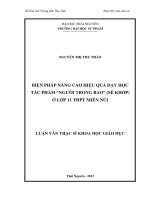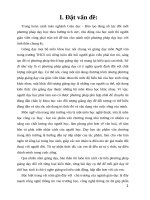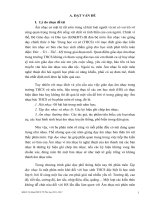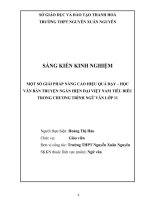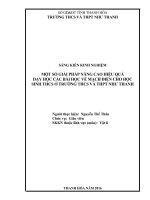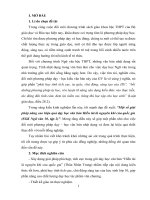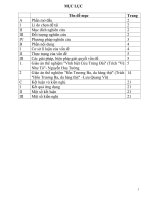Một Số Giải Pháp Nâng Cao Hiệu Quả Dạy Học Câu Điều Kiện Trong Chương Trình Tiếng Anh Lớp 11
Bạn đang xem bản rút gọn của tài liệu. Xem và tải ngay bản đầy đủ của tài liệu tại đây (263.81 KB, 44 trang )
Một số giải pháp nâng cao hiệu quả dạy học câu điều kiện trong
chương trình tiếng anh lớp 11- Trường PTDTNT Tỉnh
PHẦN THỨ NHẤT: PHẦN MỞ ĐẦU
I. Lí do chọn đề tài
Ngoại ngữ nói chung và Tiếng Anh nói riêng đã, đang và sẽ trở thành một
môn văn hóa cơ bản trong chương trình giáo dục phổ thông. Đồng thời việc giảng
dạy ngoại ngữ - Tiếng Anh cũng đang được các nhà trường, các nhà giáo dục,
nhiều dự án giáo dục và đông đảo giáo viên quan tâm và đưa ra nhiều phương pháp
dạy học thích hợp. Trong chương trình Tiếng Anh THPT, Câu Điều Kiện –
Conditional Sentences, là một trong các phần ngữ pháp lớn có trong các kì thi tốt
nghiệp THPT, thi tuyển sinh ĐHCĐ và thi học sinh giỏi. Tuy nhiên, đại đa số học
sinh mới nắm được cấu tạo và cách sử dụng của câu điều kiện loại 1 (type 1), loại 2
(type 2) và loại 3 (type 3). Các em thường vẫn lúng túng khi gặp các loại câu điều
kiện có hình thức hỗn hợp. Do vậy nhiều học sinh đã gặp khó khăn trong việc phân
biệt và làm các bài tập liên quan câu điều kiện.
Vì vậy tôi mạnh dạn đưa ra một số hình thức nhận biết câu điều kiện theo
quan niệm cũ và quan niệm mới cùng một số dạng bài tập thường gặp nhằm giúp
các em củng cố ngữ pháp và luyện tập một cách hiệu quả và đạt kết quả cao trong
các kì thi.
II. Mục đích nghiên cứu
Trong chương trình Tiếng Anh “Câu điều kiện” được đưa vào giảng dạy ở
các khối lớp 10, 11 và 12 với các dạng bài tập khác nhau. Trong chuyên đề của
mình tôi chỉ đưa ra một số cấu trúc ngữ pháp, cách xác định câu điều kiện và các
dạng bài tập về câu điều kiện với hình thức tự luận và trắc nghiệm.
III. Đối tượng nghiên cứu.
Với chuyên đề này tôi chọn đối tượng là học sinh lớp 11 và học theo chương
trình sách giáo khoa chương trình chuẩn hiện hành. Học sinh có lực học khác nhau:
giỏi, khá, trung bình và yếu.
IV. Giới hạn phạm vi nghiên cứu
Chuyên đề đưa ra công thức cấu tạo và bài tập ứng dụng của các loại câu
điều kiện có trong chương trình.
Chuyên đề này được ứng dụng ở các lớp: 11A, 11B và 11E và đạt được kết
quả: Hầu hết học sinh đã biết cách làm bài tập liên quan đến câu điều kiện phù hợp
với lực học và có tiến bộ rõ rệt.
V. Nhiệm vụ - Yêu cầu nghiên cứu
1. Nhiệm vụ
Với chuyên đề này tôi đưa ra nhiệm vụ như sau:
- Hiểu được nội dung giáo viên giới thiệu (có thể là cấu trúc, bài tập cụ thể)
- Cung cấp cho học sinh phương pháp và rèn luyện cho học sinh cách làm bài
tập về câu điều kiện qua các hình thức bài tập khác nhau phù hợp với khả năng và
nâng cao trình độ học sinh.
- Tôi muốn cung cấp một chuyên đề các dạng bài tập liên quan đến câu điều
kiện theo một hướng mới có tính chất tham khảo cho các đồng nghiệp của mình
đang giảng dạy môn Tiếng Anh ở trường PTDTNT Tỉnh Phú Thọ.
2. Yêu cầu
Chuyên đề đặt ra yêu cầu như sau:
- Giáo viên giúp học sinh hiểu, ghi nhớ và phân biệt các loại câu điều kiện
một cách dễ nhất, chính xác nhất và khoa học nhất bằng cách làm các bài tập tự
luận và trắc nghiệm về câu điều kiện.
- Học sinh biết làm các bài tập liên quan đến câu điều kiện.
VI. Phương pháp nghiên cứu
Nghiên cứu, thu thập các dạng bài tập tự luận, trắc nghiệm về câu điều kiện
và cách làm các bài tập đó. Qua đó tổng hợp, đánh giá về nhận thức cũng như khả
năng nhận thức của học sinh trong quá trình học tập.
VII. Thời gian nghiên cứu
Chuyên đề được nghiên cứu từ tháng 10 năm 2014 đến tháng 02 năm 2015.
PHẦN THỨ HAI: NỘI DUNG
CHƯƠNG I: CƠ SỞ LÍ LUẬN CỦA ĐỀ TÀI
Từ khi còn là học sinh THPT, khi học phần ngữ pháp về câu điều kiện tôi đã
luôn suy nghĩ làm thế nào để nắm được và phân biệt được các loại câu điều kiện và
làm thế nào để làm được các bài tập liên quan đến câu điều kiện đạt được kết quả
cao. Chẳng hạn như: đó là câu điều kiện loại nào? Phải chia động từ ở thì nào? Hay
làm thế nào để chuyển từ tình huống đã cho sang câu điều kiện? Đó là điều đã làm
tôi ở thời điểm đó cũng như các em học sinh bây giờ gặp khó khăn trong quá trình
học.
Hơn nữa theo phương pháp dạy- học truyền thống: giáo viên là trung tâm
còn học sinh chỉ thụ động ngồi nghe và ghi lại những gì giáo viên nói nên tiết học
ngữ pháp trở nên rất nặng nề, các em học sinh thiếu tính sáng tạo tư duy trong quá
trình học.Tuy nhiên với chương trình SGK mới hiện nay, lấy người học làm trung
tâm, luôn yêu cầu giáo viên và học sinh phải có tầm nhìn tích cực hơn trong quá
trình dạy và học. Vì vậy học sinh có khả năng tư duy, sáng tạo và chủ động hơn,
đồng thời giáo viên cũng đầu tư nhiều hơn nghiên, cứu kĩ hơn cho mỗi bài giảng
của mình.
Từ những khó khăn, những trải nghiệm trong quá trình học tập và giảng dạy,
tôi đã chọn đề tài “Câu điều kiện theo quan điểm mới” làm vấn đề nghiên cứu của
mình. Khi nghiên cứu chuyên đề này tôi cố gắng tìm các dạng bài tập khác nhau để
giới thiệu cho các em học sinh giúp các em hiểu và làm được bài tập.
CHƯƠNG II: THỰC TRẠNG CỦA ĐỀ TÀI
Qua thực tế giảng dạy và kết quả đánh giá kiểm tra ở các khối lớp với
chương trình phân ban, nhiều em đã hiểu và làm được bài tập về câu điều kiện. tuy
nhiên kết quả chưa được như mong muốn vì phần kiến thức nền của các em còn
nhiều hạn chế.
Kết quả áp dụng đối với ba lớp 11A, 11B và 11E trường PTDTNT Tỉnh như
sau:
Lớp 11A: Loại giỏi: 9.1%
Loại khá: 27.3%
Loại trung bình: 57.6%
Loại yếu: 6.0%
Loại kém: 0%
Lớp 11B: Loại giỏi: 8.8%
Loại khá: 35.3%
Loại trung bình: 50%
Loại yếu: 5.9%
Loại kém: 0 %
Lớp 11E: Loại giỏi: 17.6%
Loại khá: 26.5%
Loại trung bình: 52.9%
Loại yếu: 2.90%
Loại kém: 0%
Để thực hiện chuyên đề này tôi sẽ giải quyết các vấn đề liên quan sau đây:
* Tóm tắt kiến thức câu điều kiện theo quan điểm cũ
* Giới thiệu câu điều kiện theo quan điểm mới
* Các dạng bài tập về câu điều kiện
CHƯƠNG III: GIẢI QUYẾT VẤN ĐỀ
I. DEFINITION (Định nghĩa):
Câu điều kiện (Conditional sentences) có hai phần: mệnh đề If
(If – clause) và mệnh đề chính ( Main clause).
Ví dụ: If it rains, I will stay at home.
If- clause: If it rains
Main clause: I will stay at home.
II. TYPES OF CONDITIONAL SENTENCES (Các loại câu điều kiện)
A. Câu điều kiện theo quan điểm cũ
Có ba loại câu điều kiện:
1. Câu điều kiện loại 1 (Conditional sentences: type 1)
- Diễn tả những hành động, sự việc có khả năng thực hiện được, hoặc có khả năng
xảy ra ở hiện tại hoặc tương lai.
FUTURE ACTIONS
Eg. If you don’t work hard, you will not pass the exam.
THÓI QUEN (HABITUAL)
If + S + simple present tense ... + simple present tense ...
If the doctor has morning office hours, he visits every patiens in the affternoon.
I usually walk to school if I have enough time.
MỆNH LỆNH (COMMAND)
If + S + simple present tense ... + command form of verb + ...
If you go to the Post Office, mail this letter for me.
Please call me if you hear anything from Jane.
2. Câu điều kiện loại 2 (Conditional sentences: type 2)
- Diễn tả những hành động, sự việc không thể xảy ra ở hiện tại; hoàn toàn trái
ngược với thực trạng ở hiện tại.
Eg. If I were you, I would make friend with her.
3. Câu điều kiện loại 3 (Conditional sentences: type 3)
- Diễn tả những sự việc, hành động không thể xảy ra trong quá khứ; hoàn toàn trái
ngược với thực trạng trong quá khứ.
Eg. If he had called the police, he would not have been in trouble.
B. Các cách diến đạt khác của câu điều kiện
1. “Or”
Eg. Keep silent or you will wake the baby up.
2. “When”
Eg. I will call you when I go home.
3. “Without”
Eg. Without the sun, man would live in the darkness.
4. “Unless”
Eg. Unless you work hard, you will fail the exam.
5. Supposed (that) / Supposing (that)
Provided (that) / Providing (that)
Eg. Supposed that he were in Hanoi now, I would visit him.
6. On condition that
Eg. I will help you on condition that you help me.
7. Assuming
Eg. Assuming you went to Britain, what place would you want to visit first?
8. If only
Eg. If only I were 10 cm taller, I would become to model.
9. Cách sử dụng will, would, could, should trong một số trường hợp khác
Thông thường các trợ động từ này không được sử dụng với if trong mệnh đề điều
kiện của câu điều kiện, tuy nhiên vẫn có một số ngoại lệ như sau:
•
If you (will/would): Nếu ..... vui lòng. Thường được dùng trong các yêu cầu
lịch sự. Would lịch sự hơn will.
If you will/would wait for a moment, I will go and see if Mr Conner is
here.
If + Subject + Will/Would: Nếu ..... chịu. Để diễn đạt ý tự nguyện.
If he will listen to me, I can help him.
Will còn được dùng theo mẫu câu này để diễn đạt sự ngoan cố: Nếu .....
•
nhất định, Nếu ..... cứ.
If you will turn on the music loudly so late tonight, no wonder why your
neighbours complain.
•
If you could: Xin vui lòng. Diễn đạt lịch sự 1 yêu cầu mà người nói cho rằng
người kia sẽ đồng ý như là một lẽ đương nhiên.
If you could open your book, please.
• If + Subject + should + ..... + command: Ví phỏng như. Diễn đạt một tình
huống
dù
có
thể
xảy
ra
được
song
rất
khó.
If you should find any difficulty in using that TV, please call me.
10. Cách sử dụng if trong một số trường hợp khác
•
If... then: Nếu... thì
If she can’t come to us, then we will have to go and see her.
•
If dùng trong dạng câu suy diễn logic (không phải câu điều kiện): Động từ
ở các mệnh đề diễn biến bình thường theo thời gian của chính nó.
If you want to learn a musical instrument, you have to practice.
If you did not do much maths at school, you will find economics
difficult to understand.
If that was Marry, why didn’t she stop and say hello.
•
If... should = If... happen to... = If... should happen to... diễn đạt sự không
chắc chắn.
If you should happen to pass a supermarket, perhaps you could get some
eggs.
If.. was/were to... Diễn đạt điều kiện không có thật hoặc tưởng tượng. Nó gần
giống câu điều kiện không có thật ở hiện tại.
If our boss was/were to come in now (= if the boss came in now), we
would be in real trouble.
What would we do if I was/were to lose my job.
Hoặc có thể diễn đạt một ý lịch sự khi đưa ra đề nghị
If you were to move your chair a bit, we could all sit down.
Note: Cấu trúc này tuyệt đối không được dùng với các động từ tĩnh tại hoặc chỉ
trạng thái tư duy
Correct: If I knew her name, I would tell you.
Incorrect: If I was/were to know...
•
If it + to be + not + for: Nếu không vì, nếu không nhờ vào.
Thời hiện tại:
If it wasn’t/weren’t for the children, that couple wouldn’t have any
thing to talk about.
Thời quá khứ:
If it hadn’t been for your help, I don’t know what to do.
Not đôi khi được thêm vào những động từ sau if để bày tỏ sự nghi ngờ,
không chắc chắn. (Có nên ... Hay không ...)
I wonder if we shouldn’t ask the doctor to look at Mary.
•
It would... if + subject + would... (sẽ là... nếu – không được dùng trong văn
viết)
It would be better if they would tell every body in advance.
How would we feel if this would happen to our family.
•
If...’d have...’d have: Dùng trong văn nói, không dùng trong văn viết, diễn
đạt điều kiện không thể xảy ra ở quá khứ
If I’d have known, I’d have told you.
If she’d have recognized him it would have been funny.
•
If + preposition + noun/verb... (subject + be bị lược bỏ)
If in doubt, ask for help. (= If you are in doubt, ...)
If about to go on a long journey, try to have a good nights sleep. (= If you
are about to go on... )
•
If dùng với một số từ như any/anything/ever/not để diễn đạt phủ định
There is little if any good evidence for flying saucers.
(There is little evidence, if there is any at all, for flying saucers)
I’m not angry. If anything, I feel a little surprised.
Cách nói này còn diễn đạt ý kiến ướm thử: Nếu có...
I’d say he was more like a father, if anything
He seldom if ever travel abroad.
Usually, if not always, we write “cannot” as one word
• If + Adjective = although (cho dù là)
Nghĩa không mạnh bằng although
Dùng để diễn đạt quan điểm riêng hoặc vấn đề gì đó không quan trọng.
His style, if simple, is pleasant to read.
The profits, if little lower than last year’s, are still extremely wealthy
Cấu trúc này có thể thay bằng may..., but
His style may be simple, but it is pleasant to read.
11. Hình thức đảo ngữ của câu điều kiện
Type 1:
If-clause = Should + S (+not) + V(bare-inf.)…
Eg. If he has money, he will buy a new car.
Should he have money, he will buy a new car.
If Linda does not do her homework, she will be punished.
Should Linda not do her homework, she will be punished.
Type 2:
If-clause = Were + S (+not) + to V…
Eg. If he knew the answer, he would tell you.
Were he to know the answer, he would tell you.
If I were you, I would go abroad for studying.
Were I you, I would go abroad for studying.
Type 3:
If-clause = Had + S (+ not) + P2…
Eg. If they had not gone to Huong pagoda by coach, they would not have got
carsick.
Had they not gone to Huong pagoda by coach, they would not have got carsick.
C. Câu điều kiện theo quan điểm mới
Theo quan điểm mới, Tiếng Anh có hai loại câu điều kiện chủ yếu. Đó là: Câu điều
kiện biểu thị và câu điều kiện giả định.
1. Câu điều kiện biểu thị
a) Mệnh đề điều kiện (If – clause)
Thì của động từ và trạng ngữ chỉ thời gian phải tương ưng nhau (tức là cùng
nằm trên một bậc).
Adverbials of time
Present simple or future
Present progressive
Present perfect
Tense of verbs
Present simple tense
Present progressive tense or present simple tense
Present perfect tense or present perfect progressive
tense
Past simple
Past simple tense
Past progressive
Past progressive tense
Past perfect
Past perfect tense or past perfect progressive tense
Eg. If it does not rain tomorrow, …
If my mother is at home now, …
If he is living in London at present, …
If John was in the theatre yesterday, …
If she has been learning English for seven years, …
b) Mệnh đề chính (main clause)
- Trợ động từ : WILL / CAN
- Động từ nguyên mẫu sau trợ động từ WILL:
+ present simple / future Nguyên mẫu đơn (bare infinitive)
+ present progressive
Nguyễn mẫu tiếp diễn (be V-ing)
+ present perfect / past simple / past perfect Nguyên mẫu hoàn thành (have PII)
+ past progressive / persent perfect progressive / past perfect progressive
Nguyên mẫu hoàn thành tiếp diễn (have been V-ing)
Eg. If it does not rain tomorrow, we will go swimming.
If my mother is at home now, she will be cooking dinner.
If he is living in London at present, he will be working as an engineer.
If John was in the theatre yesterday, he will not go there again today.
If she has been learning English for seven years, she will have spoken this
language fluently.
2. Câu điều kiện giả định
a) Mệnh đề điều kiện (If-clause)
Thì của động từ và trạng ngữ chỉ thời gian không tương ứng (tức là không cùng
nằm trên một bậc).
Adverbials of time
Present simple or future
Present progressive
Tense of verbs
Past simple tense
Past progressive tense or past simple
Present perfect
tense
Past perfect tense or past perfect
Past simple
Past progressive
progressive tense
Past perfect tense
Past perfect progressive tense
Eg. If there were no air, …
If I were you, …
If he were staying at home now, …
If they had been living here for 6 years now, …
If we had not gone to Huong pagoda by coach yesterday, …
b) Mệnh đề chính (main – clause)
- Trợ động từ: WOULD / COULD
- Động từ nguyên mẫu sau trợ động từ WOULD:
+ present simple / future Nguyên mẫu đơn (bare infinitive)
+ present progressive
Nguyễn mẫu tiếp diễn (be V-ing)
+ present perfect / past simple / past perfect Nguyên mẫu hoàn thành (have PII)
+ past progressive / persent perfect progressive / past perfect progressive
Nguyên mẫu hoàn thành tiếp diễn (have been V-ing)
Eg. If there were no air, no species would exist.
If I were you, I would make friend with her.
If he were staying at home now, he would be watching his favourite football
matches.
If they had been living here for 6 years now, they would have had a lot of
friends.
If we had not gone to Huong pagoda by coach yesterday, we would not have
got carsick.
III. CÁC DẠNG BÀI TẬP VỀ CÂU ĐIỀU KIỆN
1. DẠNG BÀI TẬP TỰ LUẬN
1.1. Conditional sentences: Type 1
Example: If he runs, he will get there in time.
The cat will scratch you if you pull her tail.
Exercise 1: Put the verbs in brackets into the correct tenses.
1. David will leave for Ren tomorrow if the weather .......................... (be) fine.
2. What will you do if you ............................ (not / go) away for the weekend ?
3. The game .......................................... (start) if you put a coin in the slot.
4. If you ................................... (be) scared of spiders, don’t go into the garden.
5. We’ll have to go without John if he ( not arrive)…………….soon.
6. Please don’t disturb him if he ...................................... (be) busy.
7. If she ........... (accept) your card and roses, things will be very much hopeful.
8. If a holiday .................................... (fall) on a weekend, go to the beach.
9. If she (come)…………………………. late again, she’ll lose her job.
10. If he (wash)…………………………..my car, I’ll give him $20.
11. He’ll be late for the train if he (not start)………………………….. at once.
12. If I lend you $100, when you (repay)………………………… me?
13. Unless I have a quiet room I (not be able)……………..... to do any work.
14. If we leave the car here, it (not be)…………………….. in anybody’s way.
15. Someone (steal)…………………………. your car if you leave it unlocked.
16. Unless he (sell)………………….more, he won’t get much commission.
17. If you come late, they (not let)………………………. you in.
18. If you (not go)……………………….. away I’ll send for the police.
19. If he ..................................... (eat) all that, he will be ill.
20. What .................................. (happen) if my parachute does not open?
1.2. Conditional sentences: Type 2
Example: If I had a map, I would lend it to you.
If I were you , I’d plant some trees round the house.
Were they stronger, they could lift the table
Exercise 2: Put the verbs in brackets into the correct tenses.
1. If I knew his address, I (write)............. to him.
2. If the sun (be)................ shining now, we would go to the beach
3. If you (paint)…………….the walls white, the room would be much brighter.
4. If he knew that it was dangerous he (not come)……………………….
5. I (buy)…………………..shares in that company if I had some money.
6. If you drove more carefully, you (not have)………….. so many accidents.
7. If I (be)……….. you , I (not worry)………...............about going to university.
8. If I (have)…………………any money, I would give you some.
9. Mary doesn’t study hard. She (not pass)……… the examination unless she
worked harder.
10. What you (buy)…………………….if your father gave you $200?
11. If I ( know)………..his phone number, I would call him.
12. We would need less money if we ( live)…………….in the country
13. How (you/ feel)……………. if you were in my position?
14. If he ............................ (get) up earlier, he’d get to work on time.
15. If I ....................... (be) you, I ...................... (tell) them the truth.
16. They would go to the beauty spot if they ........................... (have) time.
17. If we .............................. (have) a car, we would drive to work everyday.
18. Where you ........... (choose) if you could live anywhere in the world ?
19. You ................................ (catch) the train if you left earlier.
20. If I ...................................... (pass) the exam, he would be astonished.
21. I wouldn’t agree with him if he ............................ (tell) me about his plan.
22. If she ..........(elect) the Prime Minister, she would invest more on education.
23. If I ............................... (be) rich, I would live in a castle.
24. If you ............................. (not – work) so hard, you would find the time.
25. If he .................................. (work) harder, the result would be better.
1.3. Conditional sentences: Type 3
Example: - If we had found him earlier, we could have saved his life.
- If the patient had got the treatment, he wouldn’t have đie.
- Had he studied hard, he would have passed the exam
Exercise 3: Put the verbs in brackets into the correct tenses.
1. If Mary (wear)…………a raincoat, she would not have got a cold.
2. There (not have)….....……an accident if the driver in front hadn’t stopped so
suddenly.
3. If she had eaten something, she (not feel)………………………. hungry.
4. If I (have)………………a sound sleep last night I would have been well.
5. If it (not rain)…………yesterday we would have had lunch in t he garden.
6. If it had not been very expensive I (buy)…………………………..it.
7. If the teacher (speak)………………more slowly Peter would have understood
the lessons.
8. If I ................. (have) my camera with me yesterday, I ...................... (take) a
picture of Alex standing on his head.
9. The cowboy pulled his gun to shoot at the rattlesnake, but he was too late. If
he ...................(be) quicker to pull the trigger, the snake ................... (not-bite) him
on the foot.
10. If you ......................... (be) more careful, you wouldn't have cut yourself.
11. If Martin had set his alarm clock, he ................................ (not oversleep).
12. If you (speak)......................more slowly, he might have understood you.
13. If he had known the whole story, he (not be)..........................so angry.
14. If I (be)...............ready when he called, he would have taken me with him.
15. I didn't know you were in hospital. If I ................ (know), I ....................(go)
to visit you.
Exercise 4: Put the verbs in brackets into the correct tenses.
1. If I (be)…………… you, I (apply) …………for a job as soon as possible.
2. I could understand the French teacher if she (speak).................. more slowly.
3. If you (make) ………………………a run for it, you’ll catch the train.
4. If Laura (not eat) ………………so much, she wouldn’t have put on weight.
5. I (accept)................................... if they invite me to the party.
6.The earthquake would have caused less damage if the house (be) ………of
stronger construction.
7. If there (be) ………………a good breeze on Sunday, we’ll go hang-gliding.
8.You can get there more quickly if you (take) …………the short cut across the
playing field.
9. If he (be) ……………taller, he (be able) ………………to join the police.
10. If she (read)............................ in bad light, she’ll ruin her eyes.
11. If I were you, I (wear)....…some warm clothes today. It’s quite cold outside.
12. Don’t worry about getting home. If you (miss) ……......……the last bus, I’ll
give you a lift in my car.
13. Jim would get better marks at school if he (do) …………more homework.
14. He (not leave) …………………his last job if the salary had been better.
15. What you (do) ………………if you saw someone drowning in the sea?
16. If I had any news, I (phone) ………………………you yesterday.
17. I don’t have much money, but if I (have) …......…, I (travel) …...……around
the world.
18. If you (tell) ……………me he was ill, I (visit) ………him.
19. If you go in the rain without a raincoat, you (catch) ………………a cold.
20. If you had been at the party last Sunday, you (meet) …….........…some old
friends.
21. I’d change this old motorcycle if I (have) …………...……enough money.
22. He would have died if the doctors (not operate) …………………on him.
23. If I had a car, I (give) ………………………you a ride.
24. If I meet Paul tomorrow, I (give) ………………………him your letter
25. If the weather (be)……nice next weekend, they (go) ………to the country.
26. If people (not eat) ……………so many sweets, their teeth wouldn’t fall out.
27. If we (take) ……………………your advice, we’d have saved a lot of time.
28. If you don’t hurry, we (be) ………………………late for the match.
29. If you didn’t smoke so many cigarettes, you (feel) ………………better.
30. She would be better-looking if she (not have) ………………such a big nose.
1.4. “Unless”
* “Unless” = If... not (nếu ...không, trừ phi)
Example: If you don’t study hard, you will fail the exam.
Unless you study hard, you will fail the exam.
If she doesn’t water these trees, they will die.
Unless she waters these trees, they will die.
If we had more rain, our crops would grow faster.
Unless we had more rain, our crops wouldn’t grow faster.
Form:
If- clause ->
Thể phủ định ->
Unless
Khẳng định
Thể khẳng định -> Khẳng định
Main clause
Không đổi.
Đổi động từ sang thể ngược lại.
Exercise 5: Rewrite the following sentences using “Unless”
1. I won’t go to school if I don’t feel better.
Unless .....................................................................................
2. Tony will talk to you if you question him.
Unless .....................................................................................
3. If you don’t put on your overcoat, you’ll be cold.
Unless .....................................................................................
4. You will fail the exam if you don’t work hard.
Unless .....................................................................................
5. You’ll get a cold if you don’t keep your feet dry.
Unless .....................................................................................
6. If I don’t leave now, I’ll miss my flight.
Unless .....................................................................................
7. If you aren’t going to the party, I won’t go.
Unless .....................................................................................
8. I can’t send you a postcard if you don’t give me your address.
Unless ......................................................................................................
9. If I won a big prize in a lottery, I’d build a school for the poor.
Unless.......................................................................................
10. I’ll call the police if you don’t leave me alone.
Unless………………………………………………………
1. 5. Changing situations into conditional sentences
* So + clause
=> Main clause
* That’s why + clause => Main clause
* Because + clause
=> If- clause
* Indicating clause of cause => If – clause
Clause of result => Main clause
Example: They don’t have enough time so they cannot do me a favour.
=> If they had time, they could do me a favour.
She has a sore throat. She doesn’t stop smoking.
=> If she stopped smoking, she wouldn’t have a sore throat
a. Change present situations into conditional sentences ( Type 2)
Exercise 6: Rewrite the following sentences using conditional sentences: type 2
1. They are poor, so they can’t help us.
If they .........................................................................
2. He doesn’t do his homework. He is always punished.
If he .............................................................................
3. He doesn’t have enough time. He can’t help me.
If he .............................................................................
4. She doesn’t take any exercise, so she is overweight.
If she .........................................................................................................
5. He doesn’t have a bicycle, so he always goes to class late.
He wouldn’t .............................................................................................
6. I am bad at English, so I can’t do homework.
I could ......................................................................................................
7. He doesn’t practise speaking French, so he doesn’t speak it fluently.
If he ..........................................................................................................
8. The meeting can be cancelled because it snows heavily.
If it .....................................................................................................
9. We don’t go because it will rain.
If it ........................................................................................................
10. John is fat because he eats so many chips.
If John ..................................................................................................
b. Change past situations into conditional sentences ( Type 3)
Exericse 7: Rewrite the following sentences using conditional sentences: type 3
1. He didn't hurry, so he missed the train.
If ...................................................................................................................
2. We didn't go because it rained.
If it hadn't ....................................................................................................
3. We got lost because we didn't have a map.
If we .............................................................................................................
4. He lost his job because he was late every day.
If he ..............................................................................................................
5. The airport was closed. She didn't fly to Rome.
If ...................................................................................................................
6. Sue felt sick because she ate four cream cakes.
If Sue ............................................................................................................
7. My brother didn't leave the car keys, so I couldn't pick him up at the station.
If my brother ................................................................................................
8. We didn't go on holiday because we didn't have enough money.
If we .............................................................................................................
9. He didn't have the ticket to the game last week. He wasn't be able to get in.
If ...................................................................................................................
10. Robert got a bad cough because he started smoking cigarettes.
If Robert .......................................................................................................
Exercise 8: Rewrite the following sentences, beginning with the given
1. It’s too cold, they can’t go swimming.
If it………………………………………………………………………..
2. We didn’t know you were in hospital, so we didn’t visit you.
If we…………………………………………………………………………..
3. The doctors can’t find out the remedy, they can’t save a lot of people.
If the doctors…………………………………………………………
4. We don’t use public bus service, we will not get rid of pollution in the city.
If we…………………………………………………………………………
5. The patient didn’t get the treatment so he died.
If………………………………………………………
6. I didn’t have an umbrella so I got wet in the rain.
If………………………………………………………
7. I am tired so I can’t cycle to work.
If I ………………. …………………………………………….
8. That house is too expensive, so I can’t buy it.
If …………………………………………………………………
9. Because he didn’t work hard last term, he lost his job.
If ………………………………………………………………..
10. It was cold yesterday, so I didn’t not go for a walk.
If it ………………………………………………………………
11. Mary didn’t have money with her, so she couldn’t buy that present.
If ………………………………………………………………..
12. There was a test yesterday. You didn’t know that, so you didn’t study.
If I had known that ….. …………………………………………..
13. The building is too high, so he can’t climb up.
If …………………………………………………………………….
14. I don’t know her phone number so I can’t phone her.
If………………………………………………………………………
15. He won’t receive the letter tomorrow if you don’t post it today.
Unless ......................................................................................................
2. BÀI TẬP TRẮC NGHIỆM
Exercise 9: Choose the best answer by circling A, B, C or D to complete the
following sentences.
1. If I …………hungry now, I……………..five sandwiches, but I’m not.
A. am – can eat
B. were – can eat
C. were – could eat
D. were – will eat
2. What would you do if you ……………..a lottery.
A. win
B. will win
C. won
D. had won
3. If you………………….a millionaire, you might be happy.
A. became
B. will become
C. become
D. had became
4. If you had tried your best, you…………………………the job.
A, will get
B. got
C. had got
D. would have got
5. If he …………………now, he…………………..the rush hour.
A. leaves / missed
B. leaves / will miss
C. leaves / would miss
D. left/ missed
6. If I…………..in his shoes, I ……………..the Browns.
A. am / wouldn’t invite
B. were / wouldn’t invite
C. were / won’t invite
D. would be/ invite
7. If he…………………..late, he would have caught his bus.
A. worked
B. has worked
C. had not worked
D. would work
8. It ............................... quicker if you use a computer.
A. will be
B. would be
C. were
D.been
9. If I knew his address, I ................................. round and see him.
A. go
B. will go
C. would go
D. went
10. If we want to get higher salary, we………………….harder.
A. work
B. would work
C. worked
D. must work
11, If I …………………her, I……………….her your love.
A. see / would give
B. see / will give
C. saw / gave
D. saw / will give
12. If I were him, I………………..somebody for help
A. asked
B. would ask
C. will ask
D. had asked
13. If you fell, you……………….yourself.
A. would hurt B. are hurting
C. will hurrt
D. hurt.
14. What …………..you do if you stop this work?
A. would
B. do
C. are
D. will.
C. had had
D. will have
15. If I ….. time, I’ll help you
A. have
B. had
16. If I found a wallet in the street, I ……….take it to the police.
A. will
B. should
C. would
D. B and C
17. What would you do if you …. a million pounds?
A. win
B. won
C. will win
D. A and C
18. If Ken ……….. the train, he would have been late for his interview.
A. missed
B. has missed
C. miss
D. had missed
19. It ............................. be a pity if she married Fred.
A. will
B. would
C. can
D. may
20. I know I’ll feel better if I .................................. smoking.
A. will stop
B. stopped
C.stop
D. had stopped
21. I … that coat if I ….you.
A. wouldn’t buy/ were
B. didn’t buy/ were
C. don’t buy/ am
D. won’t buy/ am
22. If the driver in front … so suddenly, the accident wouldn’t have happened
A. hasn’t stopped
B. hadn’t stopped C. didn’t stop
D. don’t stop
23. If I … a lot of money now, I … .....a new car.
A. have/ will buy
B. have/ would buy
C. had/ will buy
D. had/ would buy
24. If you ….here yesterday, you …me.
A. were/ would meet
B. had been/ would meet
C. were/ would have met
D. had been/would have been
25. If I find it, I … you.
A. will tell
B. shall tell
C. would tell
D. A and B
26. If I … you were in hospital, I … to see you.
A. know/ will go
B. knew/ would go
C. had known/ would have gone
D. all are incorrect
27. You are late. If you …… a few minutes earlier, you …… him.
A. came / would meet
B. had come / would have met
C. come / will meet
D. had come / would meet
28. I’d have gone swimming yesterday afternoon if I …… time.
A. had
B. have had
C. had had
D. would have had
C. should
D. would be
29. If you didn’t do this, you …… punished.
A. are
B. will be
30. If he had told me the truth, I …… him.
A. will not punish
B. would not have punished
C. would not punis
D.would have not punished
31. “What do you think about the U.S?”
“If I had known it was so industrialized, I …… come here”
A. would never have
B. would never
C. will never
D. have been
32. If they had not given me advice, I …… again.
A. would have failed
B. would fail
C. would have been failed
D. wouldn’t fail
33. If I …… a scholarship to England, my parents would be very proud of me.
A. get
B. got
C. had got
D. will get
34. Bill …… more photographs if he …… more film.
A. would take / had had
B. would have taken / had
C. would take / has had
D. would have taken / had had
35. I would have met you at the bus terminal if I …… that you were arriving.
A. know
B. had known
C. knew
D. would know
36. If there …… no floods last year, the crop …… better.
A. had been / would have been
B. were / would be
C. had / would have been
D. was / would have been
37. I don’t have enough time. If I …… more time, I …… to see you.
A. have / will come
B. had / would come
C. have had / will have come
D. had had / would have come
38. Peter failed the final exam. If he …… harder, he …….
A. has worked / will succeed
B. worked / succeeded
C. had worked / would succeed
D. had worked /would have succeeded
39. If he …… taller, he …… able to join the police.
A. is / will be
B. was / would be
C. were / would be
D. were / will be
40. If I had known it would rain, I …… my umbrella.
A. will take
B. would take
C. am going to take
D. would have taken
41. If he worked harder, he …….
